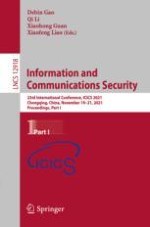2021 | OriginalPaper | Buchkapitel
VIRSA: Vectorized In-Register RSA Computation with Memory Disclosure Resistance
verfasst von : Yu Fu, Wei Wang, Lingjia Meng, Qiongxiao Wang, Yuan Zhao, Jingqiang Lin
Erschienen in: Information and Communications Security
Aktivieren Sie unsere intelligente Suche, um passende Fachinhalte oder Patente zu finden.
Wählen Sie Textabschnitte aus um mit Künstlicher Intelligenz passenden Patente zu finden. powered by
Markieren Sie Textabschnitte, um KI-gestützt weitere passende Inhalte zu finden. powered by
